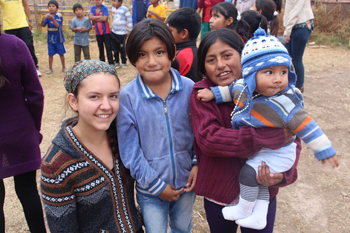For students in Rice’s interdisciplinary minor in poverty, justice and human capabilities (PJHC), service learning is a key tenet of their studies. Nine students who participated in the program’s Susan McAshan Summer Service Internship Program have created digital stories about their experiences to reflect on their service and share them with the university community.

Rice senior and Susan McAshan Summer Service intern Brooke Evans shares a smile with Sarita, a student at Carlos Fernando Centeno Güell Escuela Especial, Costa Rica’s first and largest special-education school, where Evans worked.
The program, housed in the Center for the Study of Women, Gender and Sexuality, makes it possible for students to work for nonprofit organizations and charities across the United States and around the world.
The digital stories are short three- to five-minute films made with desktop software that combines still images, music and narration. This is the second year students in the program have created such stories.
“Digital storytelling is a wonderful way to convey the PJHC internship experience,” said Anne Dayton, who oversaw the students’ projects and teaches the course PJHC Service Reflection. “For many students, this is the first time they’ve written and recorded a script instead of an essay. After sharing their many stories, students narrow down to the story that becomes their script. As they decide how best to convey their experiences, they also hone their communication skills and develop their stories into cohesive short films.”
Jordan Poles, a Wiess College junior majoring in biological sciences and pursuing minors in PJHC and statistics, completed his internship at HOPE Clinic, a federally qualified health center in Houston. HOPE provides “culturally and linguistically competent care for Houston’s underserved and linguistically isolated” patient populations, according to the clinic.
Poles served in the capacity of a medical scribe, sitting in with the patient and doctor during encounters and encoding the relevant health information into an electronic medical record.
“This experience provided me with the opportunity to engage with Houston’s diverse population in the capacity of a health care provider, which was an enlightening experience,” Poles said. “It also allowed me to use my technical and computational skills to analyze the clinic’s data and give back to the clinic staff.”
Camila Kennedy, a Jones College junior majoring in sociology and Spanish and Portuguese studies, spent her summer in Cochabamba, Bolivia, interning at the social circus nonprofit Fundación EnseñArte. The organization offers daily circus arts classes and occasional music workshops while also allowing families to participate in a microfinance program where they make and sell bracelets, Kennedy said.
“I was initially interested in working at this organization because of its commitment to arts education, something that has played a pivotal role in my life,” said Kennedy, who grew up playing cello and piano and later went to a high school that specializes in performing and visual arts. “While in Bolivia, I was able to learn about a different type of nonprofit: one that doesn’t focus directly on meeting physical needs, but focuses on more intangible ones, such as fostering creative development.”
Kennedy found digital storytelling to be an accessible format. “Working on this project has allowed me to effectively explain the key points of my experience to my friends and family because, with the visuals and music, they can immerse themselves within Cochabamba for a few minutes and have a deeper understanding of my summer than if I had just casually talked to them,” she said.

Camila Kennedy, left, a Jones College junior majoring in sociology and Spanish and Portuguese studies, spent her summer in Cochabamba, Bolivia, interning at the social circus nonprofit Fundación EnseñArte. The organization offers daily circus arts classes.
Brooke Evans, a Wiess College senior majoring in art history and minoring in PJHC and global health technologies, spent her summer working in a class for 5- to 6-year-olds with multiple disabilities at Carlos Fernando Centeno Güell Escuela Especial, Costa Rica’s first and largest special-education school.
“Starting in high school, I have engaged with my passion for working with individuals living with disabilities,” Evans said. “During my time at Rice, I have narrowed my focus to children living with disabilities. This internship allowed for me to engage with a developing nation’s system of supporting children living with disabilities.”
Evans said the digital story project has helped her to focus and reflect upon the most meaningful aspect of her experience — the development of the relationship between her and one of the students. “It has been a unique challenge to not only reflect upon the impact this relationship had on me personally but also to be able to share my experience, feelings and emotions with others in approximately three minutes,” she said.
“Students learn a variety of theories in their classes, but for the service learning, we want them to bring an open mind to their interactions with people,” said Diana Strassmann, the Carolyn and Fred McManis Distinguished Professor in the Practice of the Humanities, who directors the Program in PJHC. “By listening directly to people rather than treating them as research subjects, students gain more insight into the complex realities of poverty and injustice. Serving alongside community members helps strengthen students’ capacities for empathy, their moral imaginations and their abilities to envision solutions.”
The students’ stories will be screened at 5 p.m. Oct. 20 in the Humanities Building, Room 117. A reception will follow the screening at 5:30 p.m. in the Humanities Building lobby. To RSVP for the screening and reception, email the PJHC at pjhc@rice.edu.


Leave a Reply